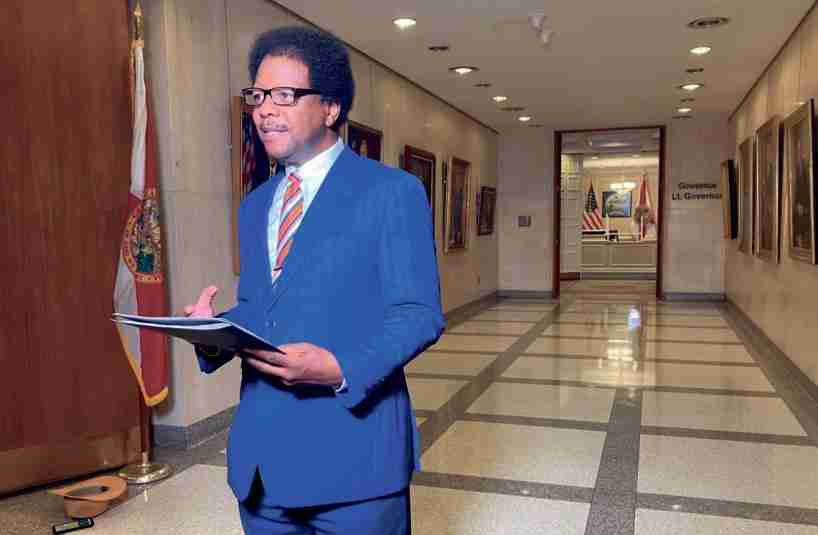Miami, Fla. – Florida’s decision to reject the College Board’s pilot program for an Advanced Placement African American studies course in high schools drew the ire of Black education and political leaders, a lawsuit, a local city’s legislation to denounce the decision and a petition.
But at least one Black elected official in the state agrees with Florida’s decision.
Leon County Commissioner Bill Proctor, one of Florida Republican Gov. Ron DeSantis’ most vocal critics, called the course trash, according to Florida Standard, a state newsletter based in Tallahassee.
Proctor, who taught African American history and is a Political Science professor at Florida A&M University, said there is grave concern about the tone and the tenor of leadership’s voice from the highest spaces in the state being hostile to teaching of African American history.
“I think it’s trash. It’s not African American history," Proctor said. "It is an ideology. I’ve taught African American history, I’ve structured syllabuses for African American history. I am African American history. And talking about ‘queer’ and ‘feminism’ and all of that for the struggle for freedom and equality and justice has not been no tension with queerness and feminist thought at all.”
Proctor once called DeSantis a warrior against the 14th Amendment’s equal protection clause with the governor’s Stop WOKE and Don’t Say Gay laws, and said racial problems still plague America.
Proctor’s support for DeSantis and the state’s Department of Education’s decision to ban the course comes after backlash by education and political leaders and a lawsuit filed by civil rights attorney Ben Crump, who’s representing three Black Florida students.
The College Board, which oversees Advanced Placement courses in the nation, sent the state a revised AP African American studies course last week after the original proposal was rejected but DeSantis said he hasn’t reviewed it yet.
The course is currently taught in 60 schools throughout the nation.
DeSantis said the original proposal for the course went against Florida’s education standards including lessons on Queer theory, critical race theory, affirmative action and the and Black Lives Matter movement.
Some Black authors who wrote about African American history also were removed from the revised course.
“That’s the wrong side of the line for Florida standards,” said DeSantis. “What’s one of the lessons about? Queer theory. Now, who would say an important part of Black history is queer theory?”
The College Board removed those lessons from the curriculum before it was rejected by Florida and sent the revised proposal to the state.
College Board CEO David Coleman told National Public Radio that the changes were made before DeSantis’ criticism and the rejection of the course.
"We began the changes that were being discussed in September of the previous year, led by the committee that is developing the course," he said. "There’s a committee of faculty. And those changes were largely complete by December, and we have those time-stamped materials. Far before the governor spoke up, we’d announced that we were going to release the revised framework on the first day of Black History Month, as we did. So it’s simple."
On the first day of Black History Month, the City of Miramar passed legislation to denounce the state’s rejection.
Miramar Mayor Wayne Messam said it is the latest example of attacks on Black people by DeSantis, a possible Republican presidential candidate in 2024.
“I can’t call the governor racist. I don’t know him personally. I don’t know his heart,” said Messam, “but what I do know is that the policies that he brings forward, it always seems to attack Black people and people of color.”
The governor “can take actions that can come against our city,” said Messam, “but we want to show we are not afraid; we will stand up for our residents.”
State Sen. Shervin Jones, a Democrat from Miami and also a vocal critic of DeSantis, said on MSNBC last week that the governor’s action is an attempt to erase Black history events as though they never existed.
Jones led a rally at the state Capitol in Tallahassee two weeks ago to protest the governor’s decision.
DeSantis’ culture of fear and intimidation and attempts at muzzling educators, won’t make history magically disappear – that’s their end goal," Jones said. "DeSantis’ systemic attack on public education is part of a larger war on our ability to think, question, and engage in our democracy."
A petition is currently being circulated by Color of Change, a national online racial justice organization, demanding DeSantis and the DOE allow the course in the schools.
The petition needs at least 40,000 signatures; 41,398 people have signed the petition to support the effort which will be presented at the upcoming Florida Legislative Session.
Brianna Beadle, a member of the organization’s Florida branch, said AP African-American studies would empower students with extensive knowledge about the contributions and lived experiences of Black people in this country," said Beadle. "Lessons would range from those uplifting our legacy in literature and the arts to lessons about how our activism has shaped this country’s laws, institutions, and democracy.
"Not only does AP African American Studies put Black history front and center, but it also creates pathways for Black students to build stronger college applications and even earn university credit."
Beadle said before the College Board piloted AP African American Studies, public school curriculums and educational materials had always fallen short.
"Back in 2021, a Louisiana textbook came under fire after omitting the Black perspective when discussing the Civil War, from sympathizing with white slave owners who could no longer exploit Black people after emancipation to downplaying the brutality of the Civil War and the events that incited it," she said.











No Comment